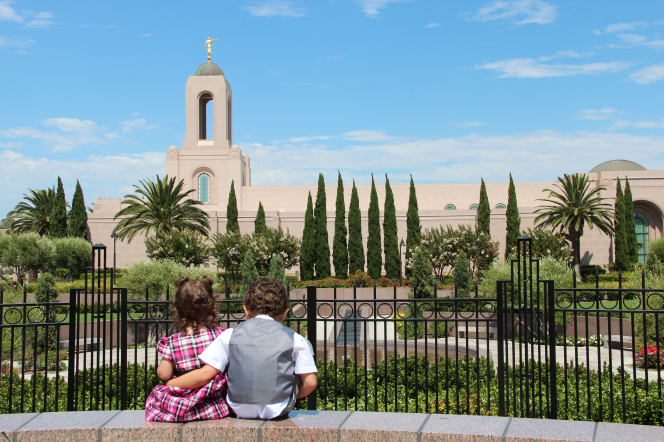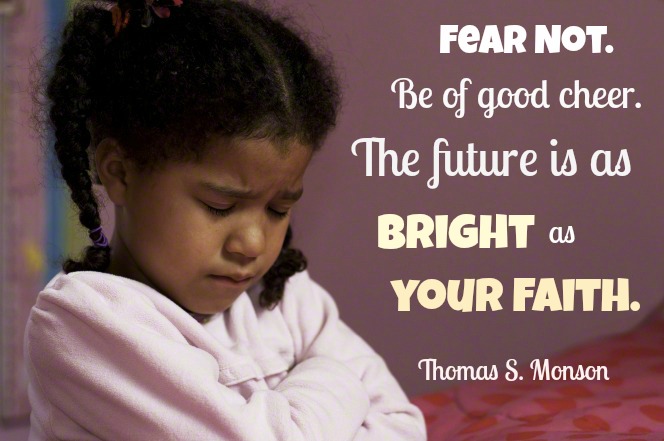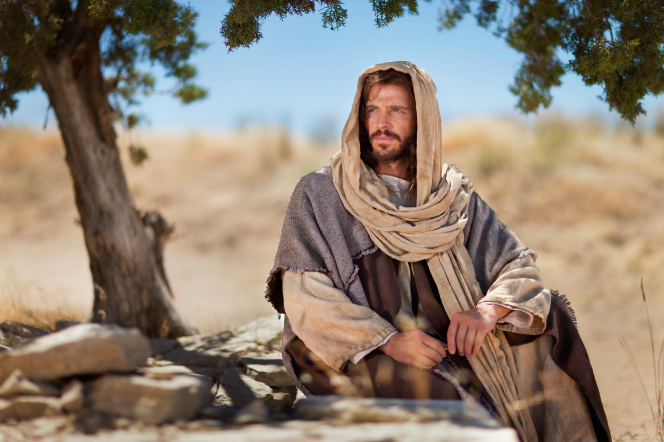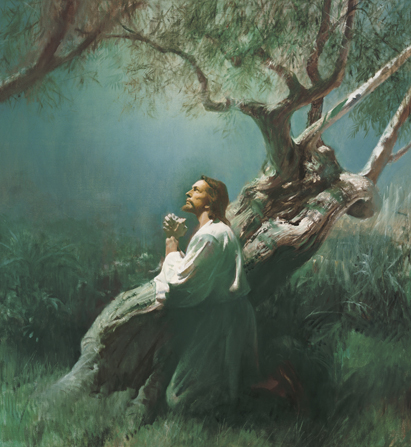The world we live in is getting downright crazy. I was watching a TV show the other day, and a man who was serving time in prison was talking about how much worse the world was today than when he was a kid. I have often heard members of The Church of Jesus Christ of Latter-day Saints say this, but I was surprised to hear that from someone who was serving time in prison for violating the law. This man’s concern was getting out in time to help his son navigate the teen years to avoid following the same path as his father. It reminded me of a quote by President Thomas S. Monson, who said,
We live in a time of great wickedness. What will protect us from the sin and evil of the world today?
Those answers are found in the gospel of Jesus Christ. But there is a caveat. President Dieter F. Uchtdorf said,
One of the ways Satan wants us to manipulate others is by dwelling upon and even exaggerating the evil in the world.
These seemingly unrelated and contradictory quotes are actually two parts to a whole perspective on navigating the world today. President Monson said,
I maintain that a strong testimony of our Savior, Jesus Christ, and of His gospel will help see us through to safety.
We need to understand what is going on in the world today without becoming bogged down with fear in having to deal with it. We need to arm ourselves with the knowledge of the gospel and face the future with faith rather than fear. So how do we do that?
The World Today
We first need to understand where the world is headed and why. One reason that our world is in chaos is that more people are losing their moral compasses. Elder Dallin H. Oaks warned,
It is well to worry about our moral foundation. We live in a world where more and more persons of influence are teaching and acting out a belief that there is no absolute right and wrong, that all authority and all rules of behavior are man-made choices that can prevail over the commandments of God. Many even question whether there is a God.
The philosophy of moral relativism, which holds that each person is free to choose for himself what is right and wrong, is becoming the unofficial creed for many in America and other Western nations. At the extreme level, evil acts that used to be localized and covered up like a boil are now legalized and paraded like a banner. Persuaded by this philosophy, many of the rising generation—youth and young adults—are caught up in self-serving pleasures, pagan painting and piercing of body parts, foul language, revealing attire, pornography, dishonesty, and degrading sexual indulgence.
On the foundation belief in right and wrong, there is an alarming contrast between the older and the younger generations. According to survey data of two decades ago, “79 percent of American adults [believed] that ‘there are clear guidelines about what’s good and evil that apply to everyone regardless of the situation.’” In contrast, a more recent poll of college seniors suggests that “three-quarters of [them] believe that the difference between right and wrong is relative.”
This moral relativism, where indulgence is praised and restraint is frowned upon, is a shaky foundation with no absolutes, just opinion. The next question to answer is why is this happening?
The Fate of the World
Although there are various answers to this question, the simplest answer is that the world is headed toward the Second Coming of Jesus Christ and these events are a fulfillment of prophecies concerning our day. Elder Oaks explained,
The scriptures are rich in references to the Second Coming, an event eagerly awaited by the righteous and dreaded or denied by the wicked. …
Four matters are indisputable to Latter-day Saints: (1) The Savior will return to the earth in power and great glory to reign personally during a millennium of righteousness and peace. (2) At the time of His coming there will be a destruction of the wicked and a resurrection of the righteous. (3) No one knows the time of His coming, but (4) the faithful are taught to study the signs of it and to be prepared for it.
… These signs of the Second Coming are all around us and seem to be increasing in frequency and intensity.
What the signs point to is an escalation of the war between God and Satan, good and evil. Elder Jeffrey R. Holland taught,
… Satan … is real, the very personification of evil. His motives are in every case malicious. … He is eternally opposed to the love of God, the Atonement of Jesus Christ, and the work of peace and salvation. He will fight against these whenever and wherever he can. He knows he will be defeated and cast out in the end, but he is determined to take down with him as many others as he possibly can.
While this seems ominous, the knowledge of who Satan is and what he is trying to do gives us power. Elder Richard G. Scott said,
Despite pockets of evil, the world overall is majestically beautiful, filled with many good and sincere people. God has provided a way to live in this world and not be contaminated by the degrading pressures evil agents spread throughout it.
A Sure Foundation
The gospel of Jesus Christ provides a sure foundation for navigating these turbulent times and changing philosophies. Bishop Dean M. Davies taught,
… Our loving and kind Father in Heaven and His Son have prepared plans, tools, and other resources for our use so that we can build and frame our lives to be sure and unshaken. The plan is the plan of salvation, the great plan of happiness. The plan lays out for us a clear picture and understanding of the beginning and the end and the essential steps, including ordinances, which are necessary for each of Father’s children to be able to return to His presence and dwell with Him forever.
Faith, repentance, baptism, the gift of the Holy Ghost, and enduring to the end are part of the “blueprints” of life. They help to form the appropriate building blocks that will anchor our lives to the Atonement of Christ. These shape and frame the supporting structure of a person’s life. Then, just as temple plans have specifications that give detailed instructions about how to form and integrate essential components, praying, reading the scriptures, partaking of the sacrament, and receiving essential priesthood ordinances become the “specifications” that help integrate and bind together the structure of life.
We find the building blocks to this foundation in the words of God’s holy prophets found not only in the scriptures but also in the modern days.
The Fear Factor
When we start laying the foundation of our faith, it’s important to understand the fear factor. President Uchtdorf said,
… Let us address the problem with fear. After all, who among us has never been compelled by fear to eat better, wear a seat belt, exercise more, save money, or even repent of sin?
It is true that fear can have a powerful influence over our actions and behavior. But that influence tends to be temporary and shallow. Fear rarely has the power to change our hearts, and it will never transform us into people who love what is right and who want to obey Heavenly Father.
People who are fearful may say and do the right things, but they do not feel the right things. They often feel helpless and resentful, even angry. Over time these feelings lead to mistrust, defiance, even rebellion.
Thus, fear is not a foundation of faith. We must understand the world but not fear it. Likewise, we must understand the truths of the gospel and follow them because we want to—not because we’re afraid of what might happen if we don’t. The Lord doesn’t want us to fear Him, He wants us to have faith in Him. That is His way. President Uchtdorf continued,
The more I come to know my Heavenly Father, the more I see how He inspires and leads His children. He is not angry, vengeful, or retaliatory. His very purpose—His work and His glory—is to mentor us, exalt us, and lead us to His fulness. …
Does this mean that God condones or overlooks behaviors that run contrary to His commands? No, definitely not!
But He wants to change more than just our behaviors. He wants to change our very natures. He wants to change our hearts.
Love—The Better Way
God wants to change our very natures. So how does He seek to motivate us? President Uchtdorf explained,
He wants us to reach out and take firm hold of the iron rod, confront our fears, and bravely step forward and upward along the strait and narrow path. He wants this for us because He loves us and because this is the way to happiness.
So, how does God motivate His children to follow Him in our day?
He sent His Son!
God sent His Only Begotten Son, Jesus Christ, to show us the right way.
God motivates through persuasion, long-suffering, gentleness, meekness, and love unfeigned. God is on our side. He loves us, and when we stumble, He wants us to rise up, try again, and become stronger.
Our Heavenly Father seeks to motivate us with love—and love is what He seeks in return. It is the first and great commandment. But why? President Uchtdorf taught,
God the Eternal Father did not give that first great commandment because He needs us to love Him. His power and glory are not diminished should we disregard, deny, or even defile His name. His influence and dominion extend through time and space independent of our acceptance, approval, or admiration.
No, God does not need us to love Him. But oh, how we need to love God!
For what we love determines what we seek.
What we seek determines what we think and do.
What we think and do determines who we are—and who we will become.
And our goal should be to become like our Heavenly Father, for that is His plan for us.
Foundation of Knowledge
Love is God’s motivator for us, but knowledge is the tool to help us understand why. Latter-day Saints believe that God’s plan of salvation teaches us where we came from, why we’re here and where we’re going after we die. It also teaches us the tools that Heavenly Father has given us to get where He wants us to go. It explains why there is a right and a wrong—and what difference it makes in our lives. Elder Robert D. Hales taught,
In a premortal council, Heavenly Father explained to us His plan of redemption. The plan was based on doctrine, law, and principles that have always existed. We learned that if we accepted and followed the plan, we would be required to willingly leave our Father’s presence and be tested to show whether we would choose to live according to His laws and commandments. We rejoiced at this opportunity and gratefully sustained the plan because it offered us the way to become like our Heavenly Father and inherit eternal life.
But the plan was not without risk: if we chose in mortality not to live according to God’s eternal laws, we would receive something less than eternal life. Father knew we would stumble and sin as we learned by experience in mortality, so He provided a Savior to redeem from sin all who repent and to heal the spiritual and emotional wounds of those who obey.
Jesus Christ was the Father’s beloved, chosen, and foreordained Son from the beginning. He sustained the Father’s plan and offered to be our Savior, saying, “Here am I, send me.” Thus, Jesus was appointed by the Father to be the One to live a sinless life in mortality, atone for our sins and afflictions, and be resurrected to break the bands of death.
The Power of Choice
One of the basic tenets of God’s plan for us is the power to choose for ourselves. President Monson said,
Scarcely an hour of the day goes by but what we are called upon to make choices of one sort or another. Some are trivial, some more far-reaching. Some will make no difference in the eternal scheme of things, and others will make all the difference.
We are here in this life, in fact, to learn how to choose between good and evil. President Monson continued,
We know that we had our agency before this world was and that Lucifer attempted to take it from us. He had no confidence in the principle of agency or in us and argued for imposed salvation. He insisted that with his plan none would be lost, but he seemed not to recognize—or perhaps not to care—that in addition, none would be any wiser, any stronger, any more compassionate, or any more grateful if his plan were followed.
We who chose the Savior’s plan knew that we would be embarking on a precarious, difficult journey, for we walk the ways of the world and sin and stumble, cutting us off from our Father. But the Firstborn in the Spirit offered Himself as a sacrifice to atone for the sins of all. Through unspeakable suffering He became the great Redeemer, the Savior of all mankind, thus making possible our successful return to our Father.
Our Heavenly Father knew that Lucifer—who is Satan—would tempt us and try to get us to make wrong choices. But through His Son, He offered us a way back. This is called repentance.
Repentance
Our Heavenly Father has given us the gift of repentance. But what is this? Elder Dale G. Renlund explained,
The word repent connotes “to perceive afterwards” and implies “change.” In Swedish, the word is omvänd, which simply means “to turn around.” The Christian writer C. S. Lewis wrote about the need and the method for change. He noted that repentance involves “being put back on the right road. A wrong sum can be put right,” he said, “but only by going back till you find the error and working it afresh from that point, never by simply going on.” Changing our behavior and returning to the “right road” are part of repentance, but only part. Real repentance also includes a turning of our heart and will to God and a renunciation of sin. As explained in Ezekiel, to repent is to “turn from … sin, … do that which is lawful and right; … restore the pledge, … [and] walk in the statutes of life, without committing iniquity.”
Yet even this is an incomplete description. It does not properly identify the power that makes repentance possible, the atoning sacrifice of our Savior. Real repentance must involve faith in the Lord Jesus Christ, faith that He can change us, faith that He can forgive us, and faith that He will help us avoid more mistakes. …
Repentance, then, is a choice to change our hearts and realign ourselves with the Savior.
Our Motivation
This is where the importance of our motivation comes in. Are we making our choices based on fear or faith? Are we choosing to obey God’s commandments because we love Him? Are we ignoring the commandments because we’re afraid of what others might think of us? True repentance requires that we turn our hearts back to the Savior and His commandments. That we decide to do what’s right because we love God and want to be like Him. As we do so, we become a disciple of Jesus Christ. Elder Hales taught,
Many people hear the word disciple and think it means only “follower.” But genuine discipleship is a state of being. This suggests more than studying and applying a list of individual attributes. Disciples live so that the characteristics of Christ are woven into the fiber of their beings, as into a spiritual tapestry.
As we become more Christlike in our behavior and actions, our faith replaces our fears. President Uchtdorf said,
We are, therefore, not ignorant of the challenges of the world, nor are we unaware of the difficulties of our times. But this does not mean that we should burden ourselves or others with constant fear. Rather than dwelling on the immensity of our challenges, would it not be better to focus on the infinite greatness, goodness, and absolute power of our God…?
When we focus on becoming more like our Savior, we can view the world— and our place in it—with faith and trust in God.










God uses our sin(s) to strengthen our faith our resilience and to make all of us better deciples of Jesus Christ.